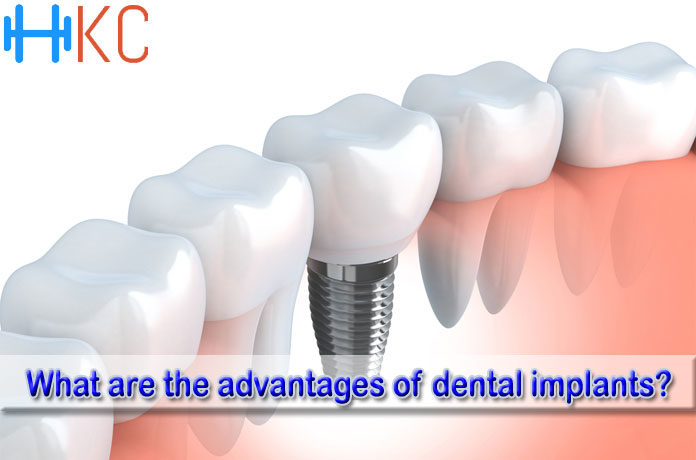What is the next best thing to real teeth? Dental implants, of course! The feel, look and function like real dentures. At times, they might even look and feel better than your original teeth. They can restore the confidence in your smile. Dental implants are the long-term investment for anyone suffering from dental cavities or missing teeth
Dental implant technology has improved over the last couple of years. It is a high-tech option for teeth replacement that can mimic real teeth perfectly. In fact, for most patients, dental implants can last a lifetime. People who have broken teeth or multiple missing teeth are ideal candidates for dental implants. In case you already have dentures that are uncomfortable, you might benefit from the state-of-the-art implant technology.
Proven benefits of dental implants
People, who have received dental implants report the advantages over other technologies that were earlier available to treat tooth decay, missing and broken teeth. If you are curious about the benefits of dental implants, here are a few common ones people always mention –
1. They act like natural teeth
Dental implants restore the complete ability of a person to chew. Even a new recipient can hardly tell the difference between the original tooth and the implant. After you get a new dental implant, you can eat your steak, chew licorice, brush, and floss like you would with your natural teeth. Unlike dentures that can come loose and dental bridges that are nowhere near perfect, these dental implants can allow you to bite into whole fruits, hard biscuits and enjoy frozen treats.
2. They are a long-term investment
Dental implants can last a lifetime if you manage to care for it properly. There may have been a time when similar implants demanded extensive care and effort for a long lifespan. However, the new implants do not need more than the regular brushing and flossing. The new technology uses titanium for the dental implants, and the material can integrate with the jawbone. The metal is non-reactive and non-toxic. It does not elicit immunological or allergic reactions. Dental bridges can last for about ten years, but implants can last for a lifetime. Check out https://pslsmiles.com/ for accounts of patients, who are enjoying life to the fullest with dental implants for decades!
3. They can stop loss of bone
When there is a tooth missing, the empty space on the jaw bone increases the rate of disintegration of the bone due to the absence of stimulation. Unless you manage to replace the missing tooth within the first year, it can cause up to 25% of the loss of the bone in the area. The decline continues at a constant rate over the next years. Older people, who often opt for dentures experience terrible pain at the site of the lost tooth since dentures are usually loose and they accelerate the disintegration due to constant friction. An implant integrates with the jawbone. Hence it stops the decay immediately. It restores chewing to normal and stimulates natural growth of bone.
4. They preserve oral health
The dental implants fill the gap resulting from a missing tooth correctly. Without implants or replacement of the missing tooth, the adjacent teeth can lose stability. The neighboring teeth can lean towards the empty space and move out of their normal position. It affects not only a person’s bite but also their appearance. A poor bite can result in problems with your temporomandibular joint (TMJ), and it can make replacement of the missing tooth almost impossible in the subsequent years. At the same time, it is possible for the person to suffer from headaches and jaw pain. Dental implants can preserve gum health by preventing food particle and plaque buildup in the tooth gap. Proper dental implants can prevent chronic bad breath and toothache.
5. They can prevent premature sagging and disfiguration
You may have seen how faces tend to sag rapidly after people lose a couple of teeth. Replacement of missing teeth with dentures is rarely enough to stop the sagging and premature aging. The bone loss from missing teeth and teeth gap are primarily responsible for the puffiness around the cheek regions we see in the elderly population. Missing teeth can cause the lower one-third of the face to sag permanently making people look older for their age. Additional changes can include thinning lips, wrinkles around the mouth and a pointy chin. Getting dental implants at the right time can prevent this from happening. It can restore your youth and prevent premature aging altogether.
6. Dental implants restore confidence
Apart from the physical discomfort, dental problems can have a profound psychological effect especially when they change the way a person looks. Decaying teeth or missing teeth affect a person’s smile. Even when you lose a single tooth, you can be looking at a long-term struggle with esthetics. Dental implants can restore your self-confidence and self-esteem to a significant level. You will enjoy rejuvenated confidence after receiving the brand new dental implants. The procedure can improve your smile and looks since they look and feel like natural teeth. At the same time, dental implants enhance the comfort level and the health of the recipient.
Dental implants can also improve speech, especially in those, who have been using dentures or dental bridges for a long time. That is a significant boost in self-confidence and self-esteem. It is an essential improvement in those, who work in customer-service or front-desk jobs. Replacement of missing teeth with dental implants reduces the chances of future infections and ensuing pain.
You may not be missing a tooth right now, but suffering from a loose tooth or a serious cavity problem. In such cases, you might want to speak to your dentist about future dental replacement options. An experienced dental surgeon should be able to explain all available options to you including dental implants. The cost of the process can vary significantly from one state to another. Before you opt for dental implants, find out if your health insurance policy covers dental procedures and treatments. Speak with your dental surgeon and your health insurance provider regarding the financial details of the process.























